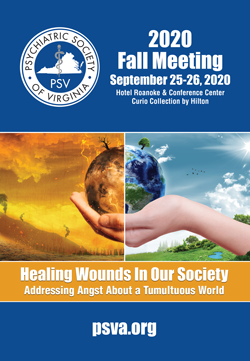Summer/Fall 2020 Issue |
|
Legislative Update
Government Affairs Update on COVID-19, General Assembly Reconvened Session, Healthcare Legislation and Budget Overview, and Advocacy Opportunities
By Mark Hickman and James Pickral
Commonwealth Strategy Group
COVID-19 Public Health Emergency
The Governor has issued several executive and public health emergency orders to address the COVID-19 pandemic. Below are highlights of executive actions directly related to healthcare providers from the Governor’s press office.
Executive Order Number Sixty – Clarification of Certain Immunity from Liability for Healthcare Providers in Response to Novel Coronavirus (COVID-19).
EO-60 reinforces certain existing statutory liability protections for Virginia healthcare workers. Due to COVID-19, public and private healthcare providers are operating with limited resources and may be forced to serve patients outside of conventional standards of care. Virginia’s code offers protections for healthcare workers and first responders in cases of emergency. This order clarifies that these statues protect healthcare workers operating during the COVID-19 crisis. Nothing in this order prevents liability in the case of gross negligence or willful misconduct.
Executive Order Fifty-Eight – Access to Medicaid-Covered Healthcare Services in Response to COVID-19.
EO-58 makes it easier for Medicaid recipients to access medical care amid the current public health crisis. The executive order eliminates copayments for individuals receiving coverage through the Family Access to Medical Insurance Security (FAMIS) program. The order also ensures that Medicaid members can obtain replacements for prosthetics, orthotics, and other durable medical equipment and supplies that are lost or damaged without requiring in-person verifications or paperwork.
The executive order streamlines the process for admitting individuals to a nursing facility by suspending preadmission screening requirements. The order also allows personal care, respite, and companion providers to work for up to 60 days, rather than the current 30 days, while background checks are conducted. Supervision and training requirements still apply. The order waives the 30-day public notice and comment period requirements for DMAS, so the agency can issue Medicaid memos to healthcare providers to ensure they receive immediate information on flexibilities in access to care.
Executive Order Number Fifty-Seven – Licensing of Healthcare Professionals in Response to COVID-19.
EO-57 implements several new policies to bolster Virginia’s healthcare workforce to assist with the Commonwealth’s COVID-19 response. The order adds physician offices and other healthcare facilities to the section in Executive Order Fifty-Two (see below) allowing hospitals, nursing facilities, and dialysis facilities to have out-of-state licensees provide in-state care. It allows Virginia-licensed nurse practitioners with two or more years of clinical experience to practice without a collaborative agreement. It provides additional flexibility to hospitals in the supervision of interns, residents, and fellows, and allows hospitals to use fourth year medical students in the provision of care.
EO-57 also allows for expanded use of telehealth. Physicians with licenses from another state who have current Virginia patients may continue to treat their patients via telehealth, which will help ensure Virginians who live in border communities do not have to travel out-of-state for care.
Executive Order Fifty-Two – Increases in Hospital Bed Capacity in Response to COVID-19. EO-52 authorizes any general hospital or nursing home to increase licensed bed capacity as determined necessary by the Commissioner of Health to respond to increased demand for beds resulting from COVID-19. The order further directs that any beds added by a general hospital or nursing home pursuant to an authorization of the Commissioner under this order will constitute licensed beds that do not require further approval or the issuance of a new license.
Public Health Emergency Two – Ban on Elective Procedures.
This order banning elective procedures expired on May 1, 2020.
Advocacy and the Medical Society of Virginia
This year the Medical Society of Virginia (MSV) is hosting its annual Advocacy Summit virtually and will focus on proposals related to COVID-19 and public health. The PSV Board will consider submissions to address mental and behavioral health issues which have been made more acute during the pandemic.
Visit the MSV website’s COVID-19 webpage for resources devoted to the physician community: https://www.msv.org/resources/hot-topics/coronavirus-disease-2019-covid-19
PSV is also working on next steps to continue the efforts made this General Assembly on prior authorization reform for mental health treatment.
Please see the PsychMD PAC plea tab under this Legislative Update section for more information about supporting our engagement in the political process.
Reconvened Session Recap
Virginia’s General Assembly met on April 22, 2020, for “Reconvened Session” to vote on the Governor’s actions on bills, including the state budget. The regular session had adjourned on March 12 after a historic election and heavy legislative workload with Democrats in control of Virginia’s government for the first time in almost 25 years.
This year’s Reconvened Session was unprecedented in its own way, as the General Assembly met amid the COVID-19 pandemic to deal with the tough policy and budgetary decisions that the crisis has made necessary. The Governor proposed a package of legislative amendments to address public health, freeze new state spending, push back local elections, delay the implementation of certain labor reforms, and grant the Governor more authority over certain spending while the economic impact of, and recovery from, COVID-19 plays out.
To ensure the safety of its members, the General Assembly abandoned the interior of the state capitol building to meet in alternative locations. The House of Delegates erected a large outdoor tent on capitol grounds, while the Senate met in an indoor event space at the Science Museum of Virginia a few miles away. Legislators sat at least 6 feet apart and often wore masks and gloves. While some glitches and snafus delayed the work of the House of Delegates, both chambers were able to conclude their business by day’s end. The Governor will likely call the General Assembly back into a special session in the summer to further address the budget after new revenue forecasts are available that accurately reflect the economic and fiscal impacts of the pandemic.
Below is a recap of the General Assembly’s actions on major public health decisions that affect providers and patients, as well as the main general healthcare issues we engaged in this session with legislation that was addressed during Reconvened Session, and updates on the bills PSV focused on since our last report.
Budget
The General Assembly for the most part accepted the Governor’s proposed $2 billion spending freeze that temporarily pauses additional discretionary spending until the state can determine revenues. This includes a pause on further expansion of Medicaid enrollment, provider rate increases, and other spending that the legislature had invested in current and new programs at state health agencies before the pandemic, such as the Department of Medical Assistance Services (DMAS/Medicaid), Department of Health, Department of Behavioral Health and Developmental Services, and Department of Social Services.
However, the General Assembly approved an increase in per diem rates for nursing homes and specialized care, and granted increased flexibility to a number of state agencies, including DMAS, in order to respond to the pandemic and take advantage of federal relief funds.
Pharmacy Benefit Managers
The General Assembly passed legislation this year that will require licensure for Pharmacy Benefit Managers (PBMs) under the Bureau of Insurance. SB 251 (Edwards) and HB 1290 (Hodges) regulate PBMs and provide more oversight into their business practices.
The Governor proposed an amendment to the Senate bill that pharmacists and pro-reform advocates believe would have limited network adequacy and benefited PBMs and insurance carriers. The Senate narrowly rejected the amendment. The Governor had previously signed HB 1290 which was identical to the Senate bill previous to the Governor’s amendment. This means that regardless of future action taken by the Governor on the Senate bill, the provisions of HB 1290 will become law.
Certificate of Public Need
While major COPN reform was a hotly debated issue this year, no consensus could be reached among stakeholders. The General Assembly passed a hospital association backed bill, SB 764 (Barker), that contains process and administrative reforms. The Governor proposed minor amendments in regard to individuals with intellectual disabilities and pushing back certain effective dates. The General Assembly concurred with the Governor’s amendments.
Immunizations
HB 1090 (Hope) ensures that the list of mandated vaccinations for school entry is science-based. It brings Virginia’s list in line with the current ACIP recommendations by adding vaccines for Rotavirus, Meningitis, Hepatitis A and HPV for boys. The most important component of the bill is that it allows the Department of Health to add future vaccinations to the list without getting approval from the General Assembly. The legislature accepted amendments by the Governor regarding HPV vaccine doses and delaying implementation until July 1, 2021.
Mental Health Bills
SB 280 Health Insurance; Mental Health Parity, Required Report
SB 280 codifies an existing requirement that the State Corporation Commission’s Bureau of Insurance (the Bureau) make an annual report regarding claims information for mental health and substance use disorder benefits. The bill adds information regarding network adequacy to such report and requires the Bureau to submit the report to the House Committee on Commerce and Labor and the Senate Committee on Commerce and Labor by September 1 of each year.
The bill directs the Joint Legislative Audit and Review Commission (JLARC) to conduct a third-party review of the Bureau's report. The bill requires JLARC, in conducting its review, to examine the information compiled by the Bureau from 2017 through 2020 and any other information it deems relevant and to report (i) its findings regarding mental health and substance abuse disorder benefits parity with medical and surgical benefits and access to mental health and substance abuse disorder services and (ii) its recommendations, if any, to the House Committee on Commerce and Labor, the Senate Committee on Commerce and Labor, and the Joint Subcommittee to Study Mental Health Services in the Commonwealth in the Twenty-First Century by December 1, 2020.
The bill passed the General Assembly unanimously and was signed by the Governor.
SB 738 Temporary Detention; Observation, Testing, or Treatment
Senator Creigh Deeds carried several mental and behavioral health related bills that PSV supported. SB 738 deals with temporary detention for observation and treatment related to intoxication. After a lot of work by stakeholders, including the emergency physicians and the Sheriffs, a substitute (amended) version was introduced that would allow for a ‘medical temporary detention order’ to be issued after the emergency custody order, ending law enforcement custody, for 24 hours.
The Governor offered a technical amendment to the bill changing a work group deadline from July 2020 to December 2020. The General Assembly accepted the recommendation and the Governor signed the bill.
Other Legislation
Below are updates on other priority legislation this session that had already been acted upon by the Governor before the Reconvened Session.
Surprise Billing
You will recall that surprise billing was a top priority for physicians and other healthcare stakeholders this year. Legislators were determined to resolve the issue for patients who go to an in-network hospital but receive care from an out-of-network provider.
After much negotiation and legislative maneuvering, the final bills – HB 1251 (Torian) and SB 172 (Favola) – are based on the Washington State model, which applies to emergency and non-emergency services at an in-network hospital, if the services involve surgical or ancillary care and are provided by an out-of-network provider. The bill includes “baseball style” independent dispute resolution, takes patients out of the middle of the billing process, does not include a rate benchmark in the Code, and allows the arbiter to consider physician charges when determining a fair payment. Other components of the bills include:
- Payment to providers of a “commercially reasonable amount” that is undefined so there is no benchmark that can then impact in-network payments.
- For the purposes of arbitration and for determining the “best offers” for the baseball style arbitration, a data set will be created based on commercial health insurance claims (excluding Medicaid and Medicare) and will be prepared using the All Payer Claims Database, in collaboration with providers and health insurers, for use by providers, facilities, insurers, and arbitrators. The data set will include:
- Median in-network allowed amount
- Median OON allowed amount
- Median billed charges.
The General Assembly passed the legislation unanimously and the Governor signed it into law.
Scope of Practice
You will recall the multiple bills this year regarding the scope of practice of other healthcare professionals:
Pharmacists
HB 1506 (Sickles) and SB 1026 (Dunnavant) as originally introduced would have greatly expanded pharmacists’ scope of practice and allowed them to provide vaccinations, test for the flu, strep and UTIs and many other services. The final bill is more limited and incremental, calling for a stakeholder work group to study and issue recommendations on whether pharmacist scope should be further expanded. The Governor has signed the legislation.Certified Registered Nurse Anesthetists
SB 264 (Bell) and HB 1059 (D. Adams) would have provided prescriptive authority to CRNAs as originally introduced. The physician community worked with the Virginia Association of Nurse Anesthetists to limit the bill to only apply as part of the periprocedural care of a patient. The bill also maintains physician supervision of CRNAs. The legislation passed both houses and has already been signed into law by the Governor.
Physician Wellness
The Medical Society of Virginia (MSV) made physician wellness one of their priority issues this session. Their legislation passed quickly and unanimously, including amendments from the Governor during session that address the civil liability and financial interest of those involved in the professional programs under the legislation. HB 115 (Hope) and SB 120 (Barker) will help address the physician burnout crisis by allowing the creation of a peer-to-peer wellness program among healthcare providers. The programs seek to remove current roadblocks and focus on early intervention through confidential support services. The program is modeled after Lawyers Helping Lawyers. MSV worked with the Virginia Trial Lawyers Association to ensure the bill does not jeopardize the state’s existing disciplinary process, but rather allows physicians to receive the support they need, when they need it.
YOUR NEWSLETTER IS NOW AVAILABLE ON YOUR SMARTPHONE AND TABLET!
JOIN PSV TODAY!
PLAN NOW!
PSV 2020
FALL MEETING
September 25-26, 2020
Hotel Roanoke
&
Conference Center
Curio Collection by Hilton
APA Find a Psychiatrist
Are you accepting new patients?
Opt into APA’s “Find A Psychiatrist” database. To view the functionality or opt-in,
CLICK HERE
FYI: A link for this option has been added to the PSV website. Select the “About” button and then “Find a Psychiatrist” from the drop down.




